
One of the first things you notice about Google Maps and the rest of the local search zoo is that usually there’s no single, isolated reason one business outranks another. Rather, all kinds of factors come into play: some obvious, some less obvious, lots of maybes, and some that probably nobody knows about. But I’d go a step further and say you’re in a much better position to get some solid rankings if you know how some factors tend to interact with each other, often in unpredictable ways.
You can’t look at local search ranking factors in a vacuum. Google sure doesn’t seem to. Now, it’s not a bad idea to work on your local SEO with a big checklist. That can get you far, especially if you stick with it. You only run into trouble when you seem to have done exactly what your strongest competitors have done – and maybe you even did it better – and you still come up short and have no idea why.
So the first thing to know is certain ranking factors seem to have relationships to each other. The second thing to know is those relationships often are strange. Not quite Hollywood strange, but counter-intuitive enough to elude most people most of the time.
Now’s probably a good time to stress that these are just my observations. Granted, they’re based on my having gotten my local SEO overalls grimy for about 71 Internet years, and I’ve seen these phenomena pop up again and again. I often explain these points to clients and others, and put them to the test all the time. So I’m confident that you’ll observe at least some of the same things I’ve observed (if you haven’t already), though you may observe different things and draw different conclusions (which I’d love to hear). In any event, it’s always possible that one phenomenon I think I understand is in reality something else. Also, I don’t claim to be able to explain everything perfectly. I’m just sharing my lab notes, and hope you put them to use in your local market.
Anyway, here are some of the many odd relationships between ranking factors that pop up in Google’s local search results (Maps + organic):
1. The lower the density of local competitors for a search term, the more geography you can rank in. Put another way: the more specialized your offering is, the wider service area you can realistically rank in. That’s simply because for more-niche search terms Google needs to harder to turn up relevant results nearby, so it needs to look farther afield. That’s true both in Google Maps and in the organic results.
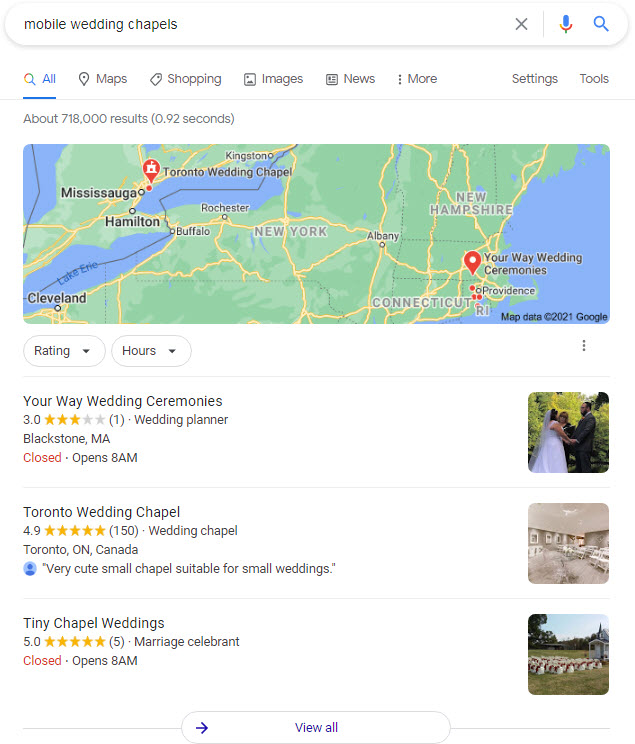
2. The lower the density of local competitors, the faster you can expect to rank for a given search term. Kind of an intuitive point – of course Google’s less picky when it’s got fewer choices – but business owners lose sight of it all the time anyway. That’s one reason when you open a new business or a new location you should focus on smaller, more-specialized terms, and on a tighter geography rather than on your whole service area. You’re not biting off more than you can chew, and are more likely to get some visibility / customers on the sooner side.
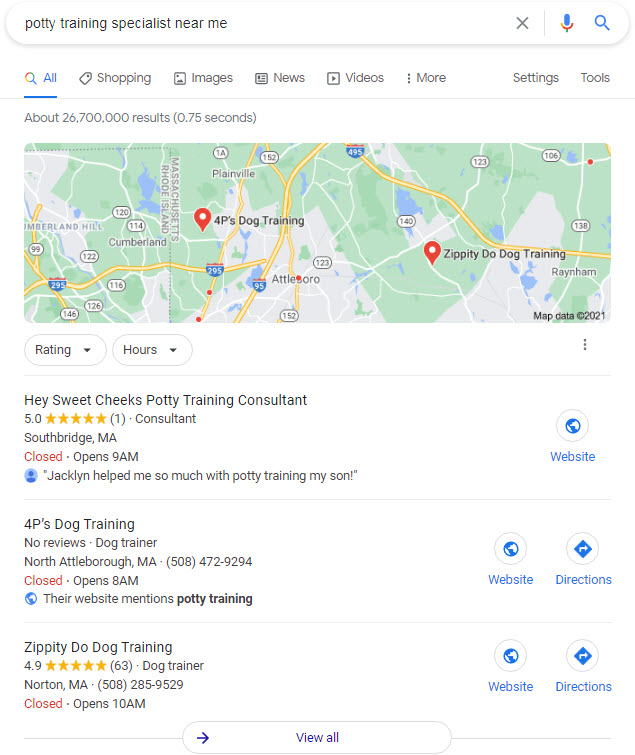
3. The stronger the backlinks profile a site has, the higher likelihood that new content on that site – or GMB pages pointing to that site – will rank well early on. Why is that bigger companies can create a Google My Business page, or add an unremarkable new page, or blast out a so-so blog post, and have it outrank most competitors right out of the chute? Not necessarily after a day, but maybe after a few weeks – and in any case way sooner than you got any good rankings.
Whenever I see a business that’s visible quickly and without spamming, I almost always find a link profile that’s better than competitors’. If your GMB page or “service” or “city” page or blog post (or whatever) is attached to a domain with good and relevant links, especially if you’ve earned them over the course of years, you’re more likely to get some solid rankings sooner, even if that exact URL on your site doesn’t have any links specifically pointing at it yet.

4. The more good links you have, the more forgiving Google is of bad links. (This phenomenon isn’t specific to local SEO, but rather is omnipresent in SEO.) Most sites that have been around for more than a couple of years have some shady-looking links, often that the owner of the site doesn’t want and had no hand in creating. There are always ants at the picnic. Google seems to know that and take it into account.
The bad news is that’s probably why some bigger brands and organizations often get away with schemes like buying links, setting up a network, or jamming exact-match anchor text into links whenever it can, even if a smaller or newer business would get penalized if it tried to get a foothold that way. Often the more-established companies have enough decent links that Google looks at the big picture and concludes that the company isn’t completely reliant on the schemes. If a new site or one without many or any good links tries some scheme and 80% of its links already look fishy to Google, then of course that plan invites trouble, because at some point it’ll just be too much.
Meanwhile, a more-established site could get away with getting the same shady links, because those links might account for 5% of its haul. Fair? Maybe not, but that’s how it always seems to go.
The good news is that to the extent you have some links that took a little effort to get and are from relevant sites, then you don’t need to worry much about penalty if you’ve got some junk links in the mix.
5. The more you develop your homepage – which is usually your GMB landing page URL – the greater the range of terms you can rank for on the local map. As I’ve found for many years, not only are you most likely to rank well on the local map if you use your homepage as your GMB landing page URL, but your homepage also is most likely to rank for a big bucket of search terms. Other pages on your site tend to rank for a smaller, more closely-related groups of terms (if you play your cards right). For most businesses, the homepage tends to have most or all of the good links.
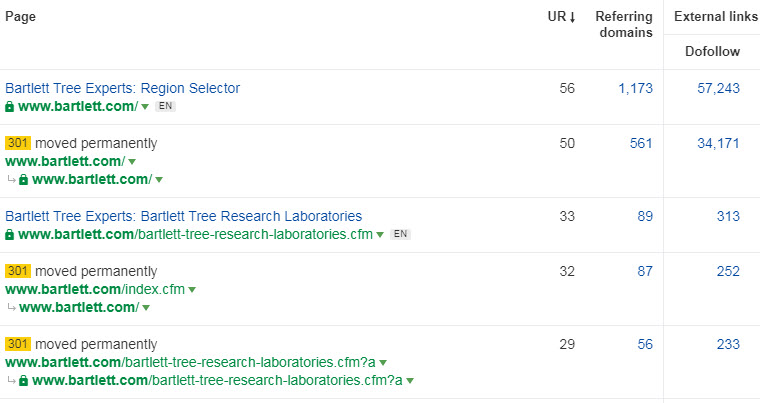
That means a few things. One is that’s probably why so often your homepage will outrank other pages on your site for terms you want those pages to rank for. The other is that your homepage tends to have just enough link oomph to rank for at least some of the terms you want for, as long as the content is relevant. That’s where most business owners trip at the 5-yard line: their homepages are lean on info on the services and service area, and read more like brochures.
6. The better your site performs organically, the more likely your GMB page is to rank well (somewhere, for some terms you care about). Most of local SEO is organic SEO with a few twists. If you’ve got several sites and aren’t sure which one to glue your GMB page(s), my suggestion is to pick the one that gets the most visibility in the organic results, preferably for locally relevant terms. (By the way, that’s why some people get mileage out of the old tactic of using a page on a BIG domain – think Facebook or Yelp or Google Sites – as their GMB landing page URL. That GMB page piggybacks off of the prominence and link mojo of that domain, and Google’s too unsophisticated or lackadaisical to do anything about it.)
7. The more you’ve worked on your local citations, the less likely you are to see any benefit from further work. Especially if you’ve got other factors already working in your favor, and especially if your citations are a total mess, you can see a bump your Google Maps / GMB rankings after you’ve squared away your listings on the basic sites. Beyond that? Not so much. Many business owners do some work on their citations, see a little boost, and think, “Cool! I worked on 20 listings and saw results, so I’ll crank out 200 listings on other sites and should get 10 times the results.” It never works out that way. There’s a point of diminishing return in citation work, and in my experience once hits it real fast.
8. The better a page performs already, the more easily you can get it to rank for a related term, or in a nearby area, or both. I can’t explain it, but time and time again I’ve noticed a “snowball” effect in which you identify a page on your site that already ranks well for certain local search terms, you add a bit of content that’s at least loosely relevant to the terms that page ranks for, and sooner or later that page ranks for those new terms, too.
So let’s say you’re a dentist and you’ve got a page that’s mighty visible for “cosmetic dentist” or a similar term. The chances are good you could get that same page to rank for the term “dental veneers” or “teeth whitening” (or both) with less strain than you could get separate, dedicated, more-targeted pages to rank for those terms. I’ve found this most likely to work on pages that tend to be broad, like the homepage, “state” pages, and sometimes “service” pages. It can help widen the variety of terms a page ranks for in the organic results, and in some cases it can widen your visibility in the 3-pack / Google Maps. Often it’s not that hard to branch out if you attempt it on a page that already does OK.
9. The more reviews you get, the easier it is to get more reviews. That can be a good thing or a bad thing. When you’ve got many negative reviews, people are more likely to pig-pile you. Or, when you’ve got many good reviews, the people who become your customers / clients / patients are more likely to have picked you because of your strong reviews, and are predisposed to write you a review when the time comes.
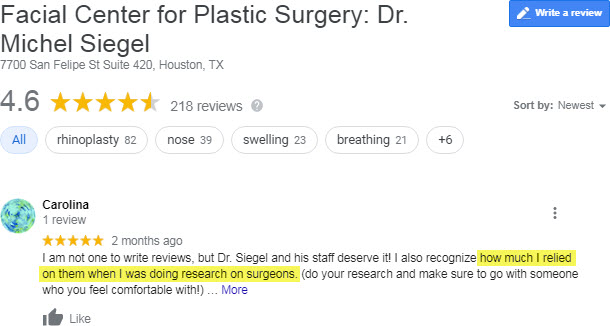
10. The longer Google Maps spam is around, the harder it is to get Google to correct it. I don’t know if that’s because older spammy GMB pages tend to have piled up more reviews (which do seem to help spam stick around), or because the business is more likely to have listings on the sites that Google uses to confirm the info it has on a certain business, or because Google has enough behavioral data on the GMB page (what terms it ranks for, who clicks on it, where those people are located, etc.). I suspect its some combination of those factors, plus some factor(s) I wouldn’t even guess. In any event, there is a sad “fake it ‘til you make it” reality that benefits the slickest spammers and well-meaning unintentional rule-benders alike.
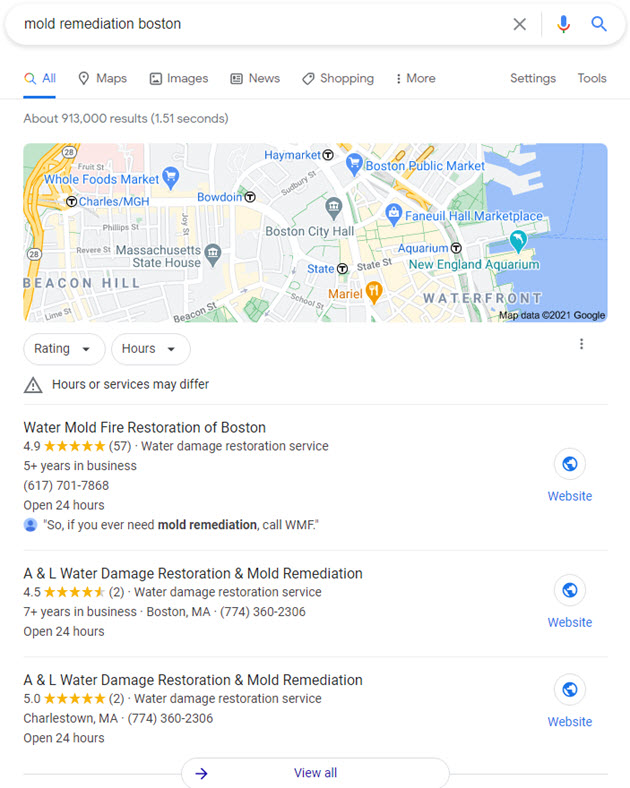
11. The faster you get good rankings, the more likely your rankings will swing up and down. It’s nice if you saw a bump just from changing the name of your business and/or Google My Business page, or moving to a different address, or doing basic work on your local listings and site. But that may also mean your competitors can knock you off with similar ease. Or it may mean that for one reason or another you’re in one of Google’s test buckets, in which it rotates seemingly random local businesses into the results, presumably just to see who clicks.
I’m not saying that poor results mean you’ve got a brilliant long game that just hasn’t worked out yet, and I’m not saying that sometimes stubborn problems don’t have simple solutions. Quick wins may lead to lasting gains, and you’ll take all the good news you can get.
I’m just saying this: easy come, easy go.
—
To what extent have you noticed those kinds of interactions? Do they seem to have helped or hurt you or your competitors?
Do you think something else is going on?
Any other “weird relationships” you’ve noticed between ranking factors?
Leave a comment!
